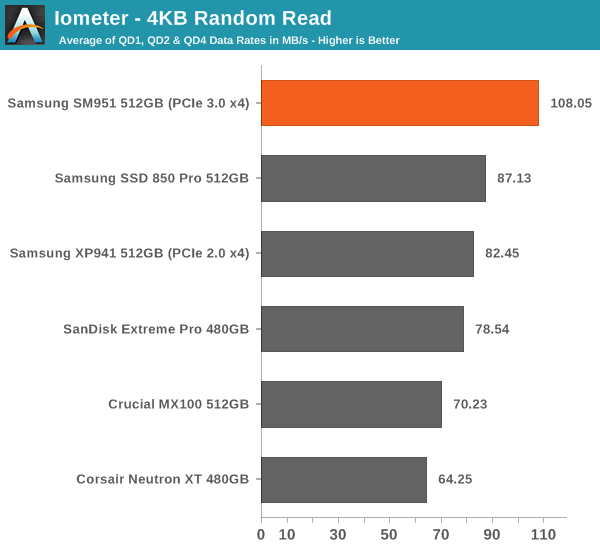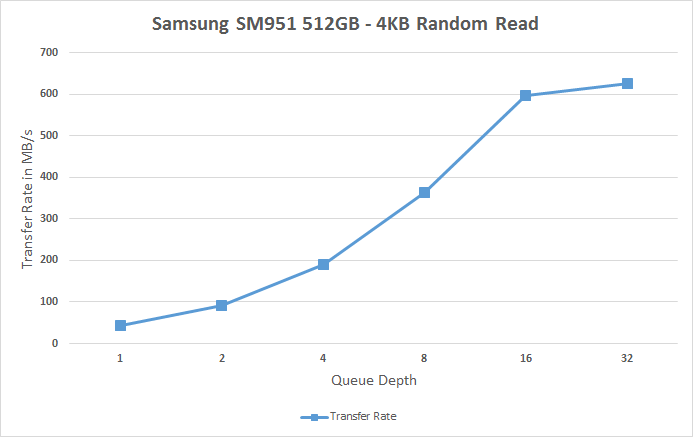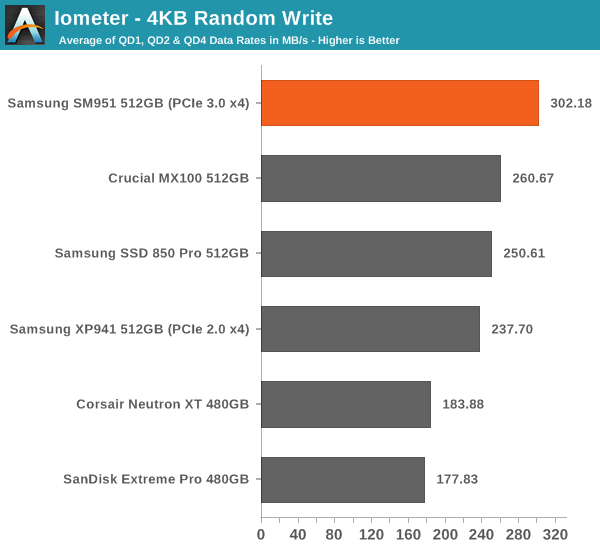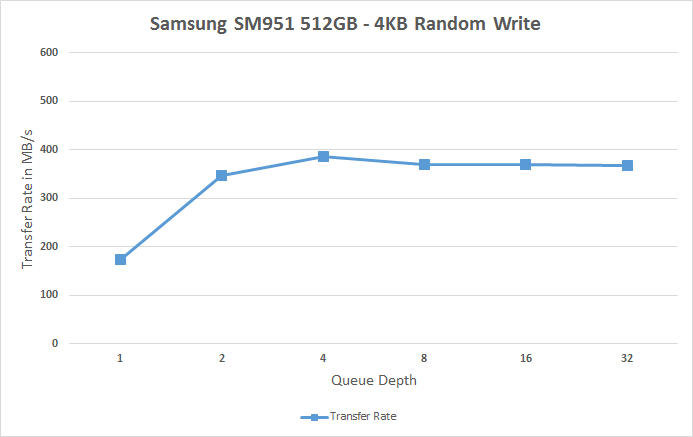Samsung SM951 (512GB) PCIe SSD Review
by Kristian Vättö on February 24, 2015 8:00 AM ESTRandom Read Performance
One of the major changes in our 2015 test suite is the synthetic Iometer tests we run. In the past we used to test just one or two queue depths, but real world workloads always contain a mix of different queue depths as shown by our Storage Bench traces. To get the full scope in performance, I'm now testing various queue depths starting from one and going all the way to up to 32. I'm not testing every single queue depth, but merely how the throughput scales with the queue depth. I'm using exponential scaling, meaning that the tested queue depths increase in powers of two (i.e. 1, 2, 4, 8...).
Read tests are conducted on a full drive because that is the only way to ensure that the results are valid (testing with an empty drive can substantially inflate the results and in reality the data you are reading is always valid rather than full of zeros). Each queue depth is tested for three minutes and there is no idle time between the tests.
I'm also reporting two metrics now. For the bar graph, I've taken the average of QD1, QD2 and QD4 data rates, which are the most relevant queue depths for client workloads. This allows for easy and quick comparison between drives. In addition to the bar graph, I'm including a line graph, which shows the performance scaling across all queue depths. To keep the line graphs readable, each drive has its own graph, which can be selected from the drop-down menu.
I'm also plotting power for SATA drives and will be doing the same for PCIe drives as soon as I have the system set up properly. Our datalogging multimeter logs power consumption every second, so I report the average for every queue depth to see how the power scales with the queue depth and performance.

While the other SSDs hover at 60-90MB/s for random reads, the SM951 provides a rather noticeable upgrade at 108MB/s.
 |
|||||||||
Looking at the performance more closely reveals that the SM951 delivers better performance at all queue depths, although obviously the difference is at high queue depths where the SM951 can take advantage of the faster PCIe interface. The SM951 actually does over 150K IOPS when the MB/s is translated into throughput.

Random write performance is equally strong. The line graphs shows how the SM951 shifts the whole curve up, implying a performance increase at all queue depths. Especially the performance at queue depths of 1 and 2 are noticeably better than on other drives.
 |
|||||||||










128 Comments
View All Comments
peevee - Friday, March 20, 2015 - link
IOmeter? Packing several weeks/months of IO into a several minutes/hours test? Seriously, your tests have become SO artificial as not to correspond to any real life experiences at all. For example, in real life SSD write speed almost does not matter, because almost always they are asynchronous - write happens into cache and user does not wait anything, or speed of writes is limited by the speed of data acquisition - case in point, you download test is always limited by much slower internet speed, or copying pictures off camera/SD card are limited by much slower camera/reader, USB or SD speeds etc. Background backup, happening without a user AT ALL? Come on!It would be actually much more interesting to see at least a few REAL numbers, like good old starting Windows or copying a catalog full of pictures and videos or starting a VM. So the users would see what amount of their time they would REALLY save by investing extra into a faster drive.
kishisaki - Tuesday, April 7, 2015 - link
How did you get all those speed with Asus Z97 Deluxe?I thought it only has a 10Gb/s M.2 Slot?
Gradius2 - Wednesday, April 15, 2015 - link
My solution is WAYYYY cheaper and bigger, I have 670GB (real size) on my little RAID, see the performance: http://i61.tinypic.com/2vt9mo6.jpgxyvyx2 - Wednesday, July 22, 2015 - link
I was able to keep the temps down on my SM951 by attaching a small heatsink... I need to do some data logging, but I don't think it's gone over 60C since:http://s76.photobucket.com/user/xyvyx/media/Comput...">[IMG]http://i76.photobucket.com/albums/j9/xyvyx/Compute...[/IMG]
stevae - Wednesday, August 12, 2015 - link
why isn't there a trouble shoot included IF your result comes back that the drive DOES NOT have trim working? this is incomplete article.Invisibleman - Sunday, August 16, 2015 - link
Kristian,Because I didn't read this review earlier and I am now planning to upgrade my PC to an M2 SSD. I came to this review.
But there is one thing I realy don't understand. As the setup is saying, you have tested with de Asus Z97 DeLuxe. I know there are 2 different versions of this one. 1 is with USB 3.1 support (new version) and 1 with USB 3.0 (Old one) this one I have.
But if I look at the specs then the Z97 DeLuxe shares the bandwide with SataExpress 1 and have only 2 x PCI Express 3.0/2.0 x 16 Slots (Single at 16x or dual at x8/x8 Mode)
But as I read the SM951 needs to have PCI 3.0 x 4bus. Am I missing something? For me it seems that the SM951 can't run full speed on this board. If it goes thru Sata Express then also get only PCI 3.0 X 2. But in the test (charts) you are mention PCI 3.0 x 4. How is this possible to get if the Max is PCI 3.0 x 2?
So can you tell me what I am missing? What do I need to do/buy extra to get this one run one full power meaning PCI 3.0 x 4.
Regards,
Hans
Hoogmade - Monday, December 7, 2015 - link
What card is used to use the SM951 in a Mac Pro 2012?I tried the Addonics ADM2PX4 but that doesn't seem to work.
dtscaps - Friday, March 11, 2016 - link
Ok, this is supposed to be a review to guide me what SSD to buy. I read 10 pages of performance specs and 72 more comments dealing with microseconds marginality. The fact that this drive does or does not have an AES self encrypting mechanism adering to OPAL 2 with a possible IEEE1667 extension IS IMPORTANT. IT IS A COMPLETE SHOW STOPPER if the drive cannot encrypt data. Maybe except if you are a kid playing with new toys.So, is this SSD self encrypting ?
Does it support Opal 2
Does it support the IEEE1667 extension?